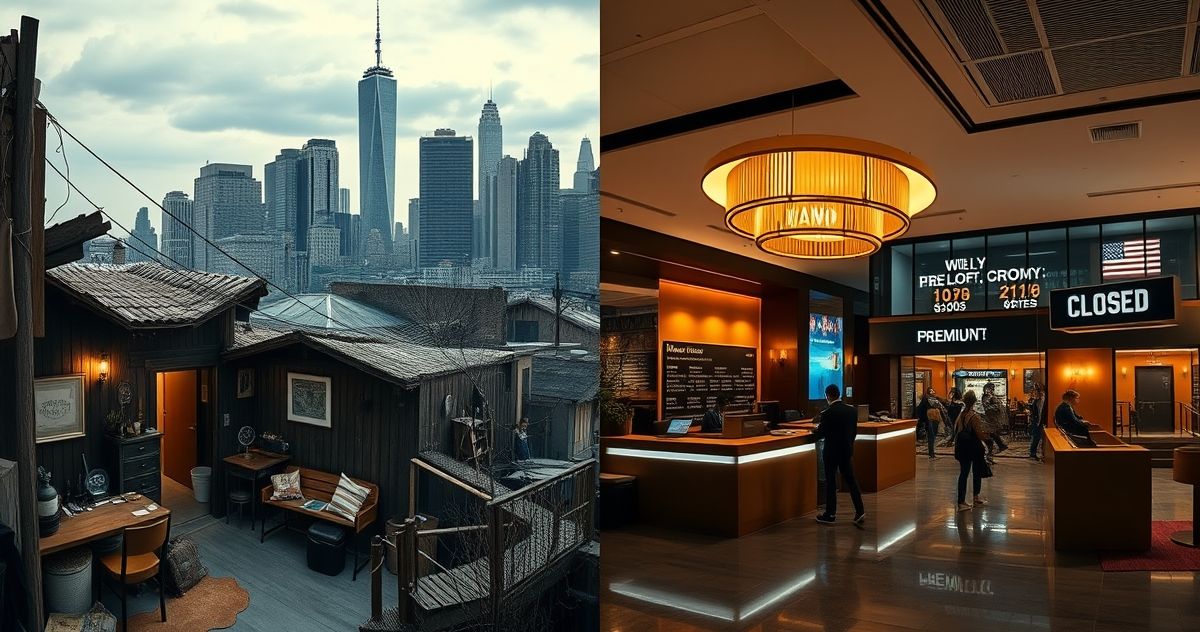Ever wonder why your trip to New York City felt a little pricier lately? Or why finding that perfect, quirky apartment for a weekend getaway seemed tougher than usual? Well, there’s a big reason for it. In 2022, New York City put some new rules in place that pretty much stopped short-term rentals – think Airbnb, VRBO, all those places – in their tracks. And guess what? Hotels in the Big Apple saw a massive boost because of it. We’re talking billions.
Yep, you read that right. According to recent findings, hotels in NYC saw their average daily rates jump by about $14 to $19 per night. And when you add all that up over the first year and a half after the ban, the entire hotel industry in the city raked in an extra $2.1 to $2.9 billion. That’s a huge pile of cash.
### Goodbye, Cozy Lofts? What Happened in NYC
So, what exactly went down? Back in 2022, New York City decided to get tough on short-term rentals. They weren’t technically “banned,” but the new laws made it incredibly difficult for people to rent out their homes or spare rooms for short stays, generally less than 30 days. You had to jump through a lot of hoops. Your host needed to be present during the stay, and the apartment had to be registered with the city, among other things. Essentially, it became a de facto ban for most casual hosts.
The idea behind it was complicated. Some folks argued these rentals were taking away much-needed housing from permanent residents. Others worried about neighborhood character or safety. Whatever the reasons, the outcome was clear: suddenly, thousands of available short-term options vanished from the market.
### The Hotel Windfall: Who Cashed In?
When all those short-term rental listings disappeared, where did people go? They went to hotels. It’s pretty simple supply and demand. Fewer options mean more demand for the remaining choices. And in this case, the remaining choices were almost entirely hotels.
Imagine a bucket with a hole in it. The short-term rentals were like a second bucket catching some of the water. When that second bucket got removed, all the water had to go into the first bucket – the hotels. With so many travelers suddenly needing a place to stay and fewer options to choose from, hotels could, and did, charge more. They didn’t have to compete with a sprawling network of apartments anymore. This wasn’t just a small bump; it was a significant financial shift. The millions of extra dollars flowing into the hotel industry tell that story clearly. It was a good time to own a hotel in New York.
### More Than Just Dollars: The Traveler’s Side
But what about you, the traveler? Or the small business owner hoping to make some extra cash by renting out their spare room? This ban impacted them too.
Think about Sarah, for instance. Last year, she and her husband planned a weekend trip to see a Broadway show in NYC. They loved finding unique, affordable Airbnb apartments in cool neighborhoods. It felt more authentic, more “local.” They found a great spot in Brooklyn for $150 a night, complete with a tiny kitchen. This year, they tried to plan another trip. The same kind of unique apartments were nowhere to be found. Instead, the cheapest hotel they could find that wasn’t super far out was over $300 a night, and it felt pretty generic. They ended up cutting their trip short because of the cost. It changed their whole experience.
This change wasn’t just about price. It also meant:
* **Fewer Unique Stays:** Those charming, local apartments that gave you a real feel for a neighborhood became much harder to find.
* **Less Flexibility:** Hotels have set check-in/out times, and kitchens aren’t always a given, limiting options for families or longer stays.
* **Higher Overall Trip Costs:** With accommodation being a major part of any travel budget, the increased hotel prices often meant people spent more or shortened their visits.
* **Lost Income for Local Hosts:** Many New Yorkers relied on short-term rentals to supplement their income, especially in an expensive city. That avenue is now mostly gone.
### The Big Picture: Is This the Future?
New York City’s move wasn’t an isolated incident. Many other cities around the world have wrestled with how to regulate short-term rentals. They’re trying to balance the needs of residents, the desire for tourism, and the economic impact on various industries.
What NYC showed us is a clear, quantifiable effect. When a major city restricts short-term rentals, the traditional hotel industry reaps significant financial benefits. It changes the landscape of travel, pushing demand back towards established businesses. For hotels, it’s a boom. For travelers seeking variety and affordability, it’s a tougher market. For those who enjoyed hosting, it’s a lost opportunity.
It makes you wonder, doesn’t it? Is this the right trade-off? Should cities prioritize hotel profits and long-term housing over the flexibility and often lower costs that short-term rentals offered? And what does this mean for the future of travel in other popular destinations?












